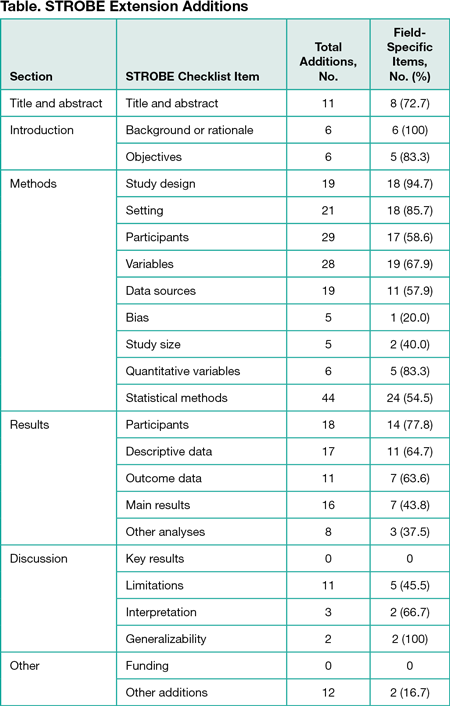Abstract
A Qualitative Assessment of the STROBE Extensions: Laying the Groundwork for Future Educational Interventions
Melissa K. Sharp,1,2 Darko Hren2
Objective
The Strengthening the Reporting of Observational Studies in Epidemiology (STROBE) guideline was developed in response to inadequate reporting of observational studies. In recent years, several extensions to STROBE have been created to provide more nuanced field-specific guidance for authors. This evaluation aims to classify the changes made in the extensions in order to identify problem areas and the level of specificity needed for future educational interventions.
Design
Two independent researchers assessed additions in each extension and achieved consensus; the intraclass correlation was calculated to measure agreement (ICC = 0.92). Individual additions were grouped by STROBE checklist items to identify the frequency and distribution of changes. Additions were coded as field specific or not field specific. Field specific was defined as information that is particularly relevant for a single field, and its guidance generally cannot be extrapolated outside that extension’s field. Not field specific was defined as information that reflects a general epidemiological tenet and can be extrapolated to most if not all types of observational research studies.
Results
A total of 297 additions were made across 13 STROBE extensions, with 36.7% of items classified as nonspecific (Table). The Methods section of STROBE contained the top 5 areas changed: statistical methods (44 additions; 45.5% nonspecific), participants (29 additions; 41.4% nonspecific), variables (28 additions; 32.1% nonspecific), setting (21 additions; 14.3% nonspecific), and study design (19 additions; 5.3% nonspecific). The items with the largest percentage of nonspecific recommendations were other additions (83.3%), bias (80.0%), other analyses (62.5%), and study size (60.0%). The quality of extensions was variable, with a range of 25% to 100% field-specific recommendations.
Conclusions
One-third of all STROBE extension recommendations were not field specific, thus highlighting gaps in understanding of epidemiological principles or deficiencies in the scope or content of the original STROBE items. Next steps include a bibliometric study to establish the prevalence of extension endorsement as well as its effect on the completeness of reporting. Results from this study will determine the association between extension endorsement and completeness of reporting. This work will form a basis for a survey of author’s knowledge, awareness, and use of STROBE to be distributed in early 2018. Together, these works will inform the creation of an educational intervention for authors reporting results from observational studies.
1Department of Epidemiology, Paris Descartes University, Paris, France, msharp@unist.hr; 2Department of Psychology, School of Humanities and Social Sciences, University of Split, Split, Croatia
Conflict of Interest Disclosures:
None reported.
Funding/Support:
This work was supported by the European Union’s Horizon 2020 research and innovation program under Marie Sklodowska-Curie grant agreement 676207.

